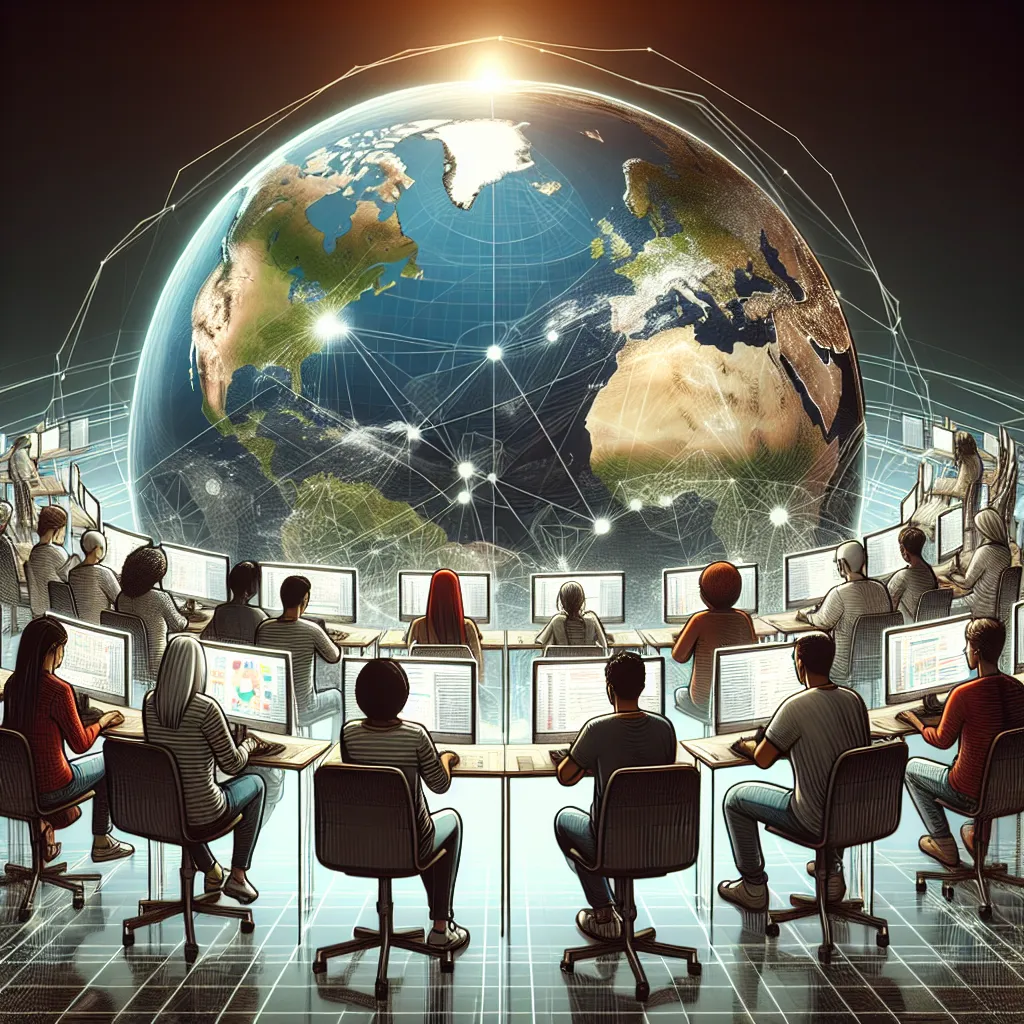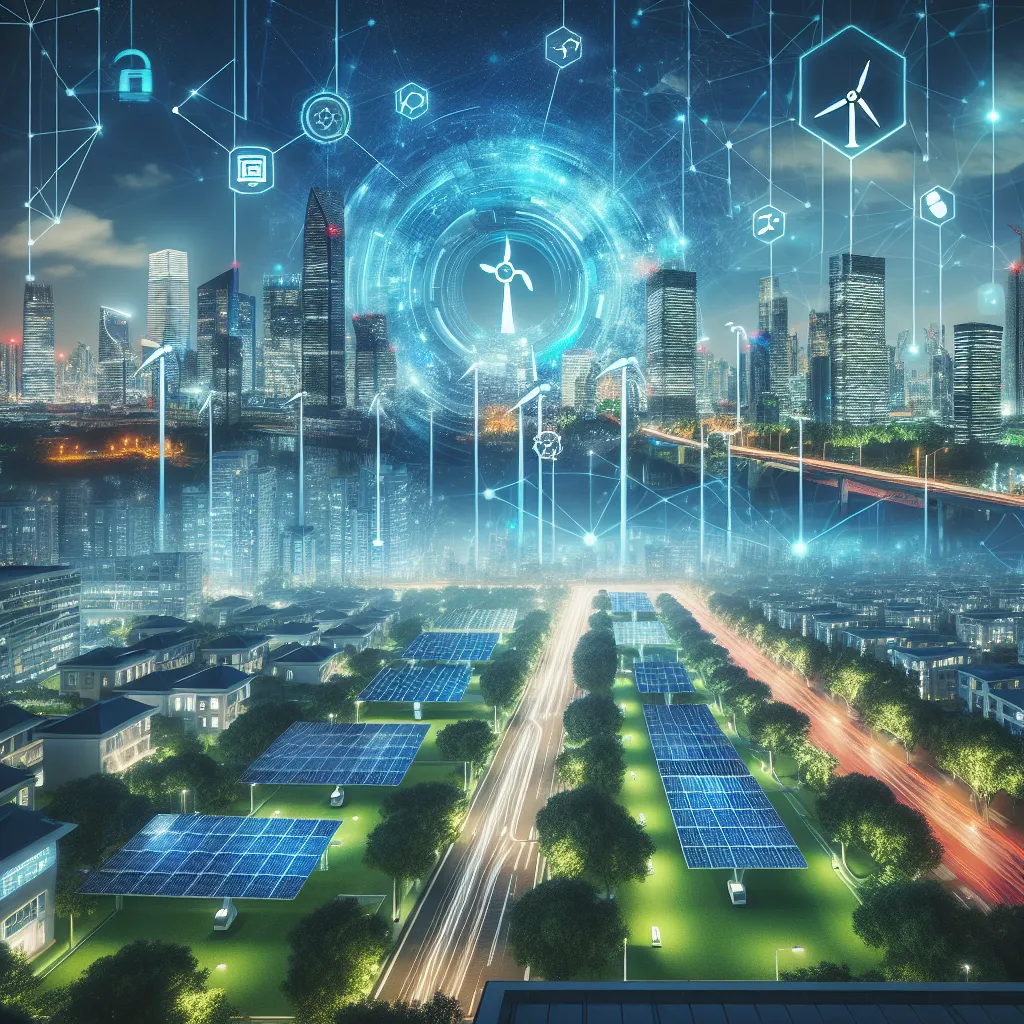As an experienced IELTS instructor, I’m excited to share with you a comprehensive IELTS Reading practice test focused on the topic “How Remote Working is Changing the Global Economy.” This test will help you prepare for the actual IELTS exam while exploring an important contemporary issue.
Nội dung bài viết
 Remote work changing global economy
Remote work changing global economy
Introduction
The COVID-19 pandemic has accelerated the trend of remote working, transforming the way businesses operate and reshaping the global economy. This IELTS Reading practice test will examine various aspects of this shift, including its impact on productivity, work-life balance, and urban development.
IELTS Reading Test
Passage 1 – Easy Text
The Rise of Remote Work
The concept of remote work is not new, but its widespread adoption has been dramatically accelerated by the COVID-19 pandemic. Companies around the world were forced to quickly adapt to a new reality where employees could no longer gather in traditional office spaces. This sudden shift has led to a paradigm change in how we view work and its relationship to physical location.
Remote work, also known as telework or telecommuting, refers to a work arrangement where employees do not commute to a central place of work. Instead, they perform their job duties from a location of their choosing, often their home. This arrangement is made possible by modern technology, including high-speed internet, cloud computing, and various collaboration tools.
The benefits of remote work are numerous. For employees, it offers greater flexibility, improved work-life balance, and the elimination of time-consuming commutes. For employers, it can lead to reduced overhead costs, access to a wider talent pool, and potentially increased productivity. However, remote work also presents challenges, such as maintaining team cohesion, managing work-life boundaries, and ensuring effective communication.
As we move forward, it’s clear that remote work will continue to play a significant role in the global economy. Many companies are adopting hybrid models, combining remote work with occasional in-office presence. This shift is not only changing how we work but also where we live, how cities are structured, and how economic activity is distributed across regions and countries.
Questions 1-5
Do the following statements agree with the information given in the passage?
Write:
TRUE if the statement agrees with the information
FALSE if the statement contradicts the information
NOT GIVEN if there is no information on this
- Remote work is a completely new concept that emerged during the COVID-19 pandemic.
- Remote work allows employees to work from any location they choose.
- The adoption of remote work has been slow and gradual over the past decade.
- Remote work can potentially increase productivity for employers.
- All companies are planning to shift to a fully remote work model in the future.
Questions 6-10
Complete the sentences below.
Choose NO MORE THAN TWO WORDS from the passage for each answer.
- Remote work is also referred to as telework or ____.
- Modern technology, including high-speed internet and ____, has made remote work possible.
- For employees, remote work offers greater flexibility and improved ____.
- One challenge of remote work is maintaining team ____.
- Many companies are adopting ____ models, combining remote work with occasional in-office presence.
Passage 2 – Medium Text
Economic Implications of the Remote Work Revolution
The shift towards remote work is having profound implications for the global economy, reshaping everything from real estate markets to urban development patterns. As employees are no longer tethered to physical office locations, we are witnessing a redistribution of economic activity that could have long-lasting effects on cities, regions, and even countries.
One of the most immediate impacts has been on commercial real estate. With fewer employees coming into the office, many companies are downsizing their office space or adopting flexible workspace solutions. This trend has led to declining demand for commercial properties in central business districts, potentially threatening the economic ecosystems that have developed around these urban cores.
Conversely, residential real estate markets in suburban and rural areas have seen increased demand. As remote workers seek more space and a lower cost of living, there has been a noticeable migration away from expensive urban centers. This shift could lead to a revitalization of smaller towns and cities that have previously struggled to attract skilled workers and economic investment.
The remote work revolution is also reshaping the labor market. Geographical barriers to employment are diminishing, allowing companies to tap into a global talent pool. This increased competition for jobs could lead to wage equalization across regions, potentially benefiting workers in lower-cost areas while putting pressure on salaries in traditionally high-wage urban centers.
Moreover, the rise of remote work is accelerating the growth of the gig economy and freelance work. As companies become more comfortable with remote collaboration, they are increasingly turning to contingent workers for specific projects or specialized skills. This trend is creating new opportunities for workers but also raising questions about job security and benefits.
The environmental impact of remote work is another important consideration. While the reduction in commuting has led to decreased carbon emissions in many cities, the overall effect is complex. Increased home energy usage and the potential for more dispersed living patterns could offset some of these gains.
As we navigate this transition, policymakers and business leaders must grapple with these far-reaching economic implications. The challenge lies in harnessing the benefits of remote work while mitigating its potential negative impacts on urban economies and social structures.
Questions 11-15
Choose the correct letter, A, B, C, or D.
-
According to the passage, the shift towards remote work is:
A) Only affecting large cities
B) Having minimal economic impact
C) Reshaping various aspects of the global economy
D) Primarily influencing the technology sector -
The demand for commercial real estate in central business districts is:
A) Increasing rapidly
B) Remaining stable
C) Declining
D) Not mentioned in the passage -
The passage suggests that remote work could lead to:
A) The complete abandonment of urban areas
B) A revitalization of smaller towns and cities
C) An increase in international migration
D) Higher property prices in all areas -
According to the text, the impact of remote work on the labor market includes:
A) Reduced competition for jobs
B) Higher wages in all regions
C) Potential wage equalization across regions
D) Decreased demand for skilled workers -
The environmental impact of remote work is described as:
A) Universally positive
B) Entirely negative
C) Complex and potentially mixed
D) Not significant enough to consider
Questions 16-20
Complete the summary below.
Choose NO MORE THAN TWO WORDS from the passage for each answer.
The remote work revolution is having significant effects on various aspects of the economy. In the real estate sector, there’s reduced demand for (16) ____ properties in city centers, while residential areas in (17) ____ and rural locations are becoming more popular. The labor market is also changing, with companies now able to access a (18) ____ talent pool. This shift is also boosting the growth of the (19) ____ economy. While there are potential environmental benefits due to reduced commuting, the overall impact is (20) ____ and requires further study.
Passage 3 – Hard Text
The Socioeconomic Repercussions of Widespread Remote Work
The inexorable shift towards remote work, catalyzed by technological advancements and accelerated by the global pandemic, is engendering a profound transformation in the socioeconomic fabric of societies worldwide. This paradigm shift extends far beyond the immediate impacts on individual workers and businesses, precipitating a cascading series of effects that are reshaping urban landscapes, altering demographic trends, and reconfiguring the distribution of economic activity on a global scale.
One of the most salient consequences of this transition is the potential decoupling of economic opportunity from geographical location. Historically, high-paying knowledge-based jobs have been concentrated in major urban centers, driving patterns of migration and urban development. However, as remote work becomes more prevalent, we are witnessing an incipient reversal of this trend. Workers are increasingly prioritizing quality of life over proximity to traditional business hubs, leading to a redistribution of human capital that could have far-reaching implications for regional economic development.
This demographic shift is catalyzing a reevaluation of urban planning and infrastructure investment. Cities that have long served as economic powerhouses may need to reimagine their role and functionality in a world where physical presence is no longer a prerequisite for economic participation. Conversely, smaller cities and rural areas are presented with unprecedented opportunities to attract skilled workers and diversify their economies. This rebalancing could potentially ameliorate longstanding issues of regional inequality and urban overcrowding.
However, the socioeconomic impacts of remote work are not uniformly positive. There is a risk of exacerbating existing digital divides, as access to high-speed internet and advanced technologies becomes an even more critical determinant of economic opportunity. Moreover, the shift to remote work may disproportionately benefit knowledge workers, potentially widening the gap between them and workers in sectors that require physical presence.
The globalization of the labor market through remote work also raises complex questions about taxation, labor laws, and social safety nets. As workers become increasingly mobile, and companies can hire from anywhere in the world, traditional models of employment-based social contracts may need to be reconsidered. This could lead to a fundamental restructuring of how societies fund and deliver public services and social protections.
Furthermore, the rise of remote work is intrinsically linked to the broader trend of digitalization and automation. As companies invest in technologies to facilitate remote collaboration, they are simultaneously laying the groundwork for increased automation of certain tasks. This symbiosis between remote work and automation could accelerate the pace of technological unemployment, necessitating proactive policies to manage workforce transitions and ensure economic inclusivity.
The environmental implications of this shift are equally complex. While reduced commuting may lead to decreased carbon emissions in the short term, the long-term effects are less clear. The potential for more dispersed living patterns could lead to increased energy consumption and habitat disruption if not managed carefully. Balancing the benefits of remote work with sustainable urban development will be a critical challenge for policymakers in the coming decades.
In conclusion, the widespread adoption of remote work represents a seismic shift in how societies organize economic activity. While it offers the potential for greater flexibility, improved work-life balance, and more distributed economic opportunities, it also presents significant challenges. Navigating this transition successfully will require adaptive policies, innovative urban planning, and a reimagining of social contracts to ensure that the benefits of this new paradigm are equitably distributed across society.
Questions 21-26
Complete the sentences below.
Choose NO MORE THAN TWO WORDS from the passage for each answer.
- The shift towards remote work is causing a profound transformation in the ____ of societies worldwide.
- Remote work is leading to a potential ____ of economic opportunity from geographical location.
- The demographic shift caused by remote work is prompting a ____ of urban planning and infrastructure investment.
- The globalization of the labor market through remote work raises questions about traditional models of ____ social contracts.
- The rise of remote work is closely connected to the broader trend of ____ and automation.
- Balancing the benefits of remote work with ____ will be a critical challenge for policymakers.
Questions 27-30
Choose FOUR letters, A-H.
Which FOUR of the following are mentioned in the passage as potential effects or challenges of widespread remote work?
A) Increased urban population density
B) Exacerbation of digital divides
C) Reduced carbon emissions from commuting
D) Higher property prices in all areas
E) Widening gap between knowledge workers and others
F) Decrease in global economic productivity
G) Need for restructuring social safety nets
H) Uniform improvement in quality of life for all workers
Questions 31-35
Do the following statements agree with the claims of the writer in the passage?
Write:
YES if the statement agrees with the claims of the writer
NO if the statement contradicts the claims of the writer
NOT GIVEN if it is impossible to say what the writer thinks about this
- The shift to remote work will completely eliminate regional economic inequalities.
- Smaller cities and rural areas have new opportunities to attract skilled workers due to remote work.
- The environmental impact of remote work is entirely positive and straightforward.
- Remote work will lead to a decrease in the pace of technological unemployment.
- Successfully managing the transition to widespread remote work will require adaptive policies and innovative urban planning.
Answer Key
Passage 1
- FALSE
- TRUE
- FALSE
- TRUE
- NOT GIVEN
- telecommuting
- cloud computing
- work-life balance
- cohesion
- hybrid
Passage 2
- C
- C
- B
- C
- C
- commercial
- suburban
- global
- gig
- complex
Passage 3
- socioeconomic fabric
- decoupling
- reevaluation
- employment-based
- digitalization
- sustainable urban development
- B, C, E, G
- YES
- NO
- NOT GIVEN
- YES
- YES
Conclusion
This IELTS Reading practice test on “How Remote Working is Changing the Global Economy” covers a wide range of aspects related to this important topic. By working through these passages and questions, you’ve not only practiced your reading skills but also gained insights into the complex ways remote work is reshaping our world.
Remember, success in IELTS Reading requires not just understanding the content, but also familiarity with various question types and effective time management. Keep practicing with diverse topics and question formats to improve your skills.
For more IELTS preparation resources, check out our articles on the rise of coworking spaces in the post-pandemic world and the impact of artificial intelligence on global employment. These topics are closely related to the changing nature of work and can provide additional context for your IELTS studies.
Good luck with your IELTS preparation!


